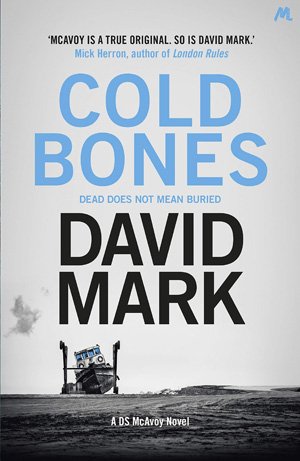
Written by David Mark — Hull, on the east coast of England, may not seem the most obvious setting for crime fiction, but local author David Mark is still going strong eight novels into the DS Aector McAvoy series.
Mark was a crime reporter before he took up writing crime fiction, and his keen understanding of the area, its history and traditions, not only informs the plot but also provides a sense of place which left me feeling as if I knew the area too. His sympathetic portrait of the city, especially its economic struggles following the decline of the fishing industry, is a major attraction of the novel.
The cold bones of the title presumably refer to elderly Enid Chappell, discovered by McAvoy frozen solid in her bath, after a concerned neighbour asks for a safe and well check. Although an examination at the scene is difficult, McAvoy can spot that her fingers have been broken. Other crime scene irregularities point towards murder, including a missing model fishing boat and a cryptic crossword half completed in which his name has been written in one of the columns.
Meanwhile, McAvoy’s boss and series regular Trish Pharaoh is in Iceland running down a case which she hopes won’t be a wild goose chase. A local freelance reporter, Chandler, washed up on the shore in Iceland just a few days ago. His car had been left at an isolated point on the coast, and local information suggests it’s not uncommon for tourists to misjudge the rocky coast and come a cropper. Pharaoh might have been inclined to let the locals record a misadventure verdict, had Chandler not mouthed the name McAvoy before succumbing to his injuries. Of particular interest to Pharaoh is the last job Chandler did before he died; it was for a disreputable scandal rag called CrymeLog, but the story was about a local girl whose disappearance was never solved.
Roberta Ballantine went missing in 1986. Indirectly, she was a victim of the seas the local fisher men trawled at great personal risk. Her father Lachlan died when she was an infant, and then her older brother Rory died when she was just 13. She lived with Rory’s widow, Mags, but lost her way before disappearing for good. Chandler’s theory was that she was the victim of a maritime serial killer, an itinerant sailor who sought out vulnerable women close to port and who then got away on the next available vessel.
Back in Hull, McAvoy has begun filling in details about Enid Chappell. She was an outsider of sorts, strong-willed at a time when women were expected not to speak their minds. She was a spinster, rumoured to have been a lesbian, and worked as a social worker advocating for the impoverished Hessle Road community where she worked in child protection. She had remained active in social causes after retirement, and was considered somewhat of a firebrand, though most recently the onset of dementia had tempered her fearsomeness. Although the victim, Enid is the most interesting of the book’s many characters despite only being described through the recollections of other characters. It’s a shame that Mark didn’t include any flashback scenes from her perspective.
The link that connects the two current victims with Roberta Ballantine forms the main plot of the novel and I won’t spoil it here. That Mark has his two principal protagonists investigating it separately adds some tension to the story, but is not without its drawbacks. I’m a new reader of the McAvoy series, and the relationship that is hinted at between McAvoy and Pharaoh appears to be a complex one, and a strength of the series. Separating them for the course of the book deprived us of this facet, and without it McAvoy seems a little lifeless, and too much of an everyman to be memorable.
It’s highly recommended you start at the beginning with this series, and the excellent The Dark Winter.
Mulholland Press
Print/Kindle/Audio
£9.99
CFL Rating: 3 Stars












